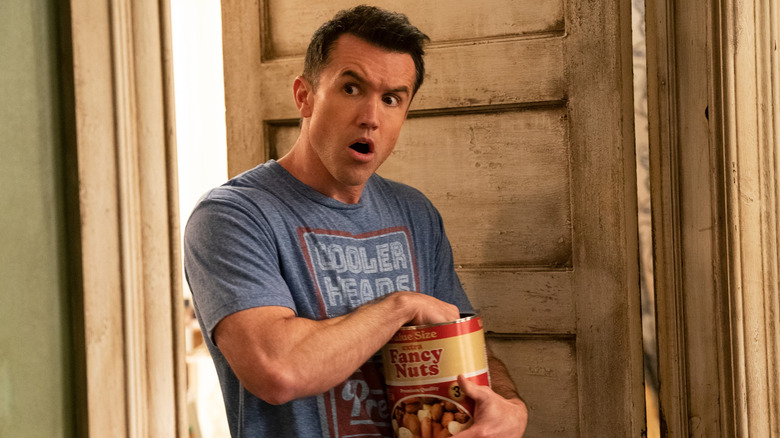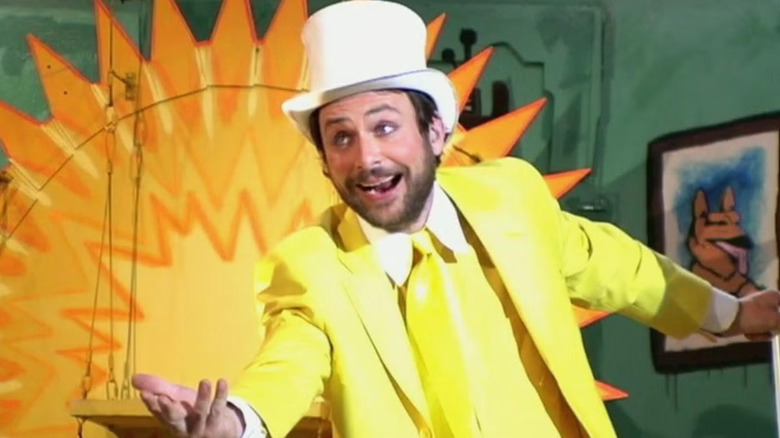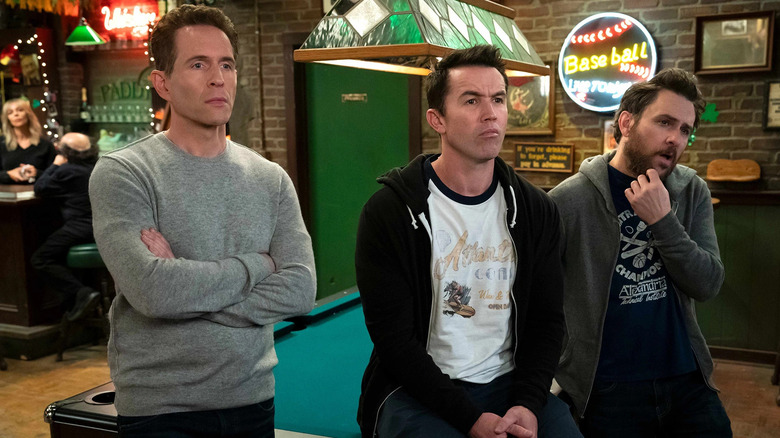Rob McElhenney Has One Requirement For Every Episode Of It's Always Sunny In Philadelphia
"It's Always Sunny in Philadelphia" has been going on for 16 seasons now, and the show still feels like it's got a good 16 seasons left to go. Of all the live-action sitcoms today, only "Curb Your Enthusiasm" can match up to the show's longevity, and "Curb" takes way longer breaks between seasons.
For a show to go on as long as "Always Sunny" has, there needs to be a strong creative code the writers abide by. That includes certain "jump the shark" roads the writers are fully aware of from the get-go, which they promise through sheer force of will to never go down. That's why "Always Sunny" has never done the much-maligned straightforward clip show episode, nor has it given any of its characters a child to take care of long-term. "Always Sunny" has learned from the mistakes of all the sitcoms before it, and it's managed to avoid those mistakes for nearly two decades.
For Rob McElhenney, who both plays Mac and serves as the show's co-creator, there's one clear requirement the show must abide by if it wants to keep its edge. "Most importantly, what we're always talking about is, for as unbelievable as some of the storylines may seem, we have to believe that the characters believe that what they're doing gets them what they want," he explained to Daily Actor in 2012. "That's the most important aspect of breaking a story, so it doesn't just feel like a series of funny events. That we really justify why these characters are acting the way that they do."
You can always see the logic, no matter how flawed
Sure enough, you can pick pretty much any episode on the show and see this rule at play. When Charlie writes a whole musical in his attempts to woo The Waitress in season 4, we believe that Charlie genuinely thinks this is a solid plan to win her hand in marriage. We also see this feverishly intense belief of his in the way he turns into a theatre diva behind-set, refusing to handle criticism from the rest of the gang and screaming at Dee when she asks for reasonable script changes. We understand what Charlie wants to achieve — a musical so beautiful that it melts away years of The Waitress's resentments towards him — and we can see the reality of what he's making: a shoddy musical about a kid (maybe) getting molested, one that makes Charlie look like a total creep. Part of Charlie is aware of the dissonance here, which is why he's so unusually high-strung throughout the episode.
Maybe the best example of this rule is the season 16 storyline where Mac tries to manipulate Phillies player Chase Utley into playing a game of catch with him. It's a scheme that involves inventing a fake dead child and (for some reason) suddenly switching to a questionable British accent. Like Charlie in "The Nightman Cometh," this is some deeply bizarre behavior, but it never feels like the show's just being zany for zaniness' sake. Mac has had a long-established desire to get himself a loving father figure, and a game of catch with Chase Utley would be a temporary fulfillment of that dream. Yes, Chase Utley is technically younger than Mac, but that's irrelevant.
Has the show been slipping, though?
One of the weakest episodes of season 16 was "Celebrity Booze: The Ultimate Cash Grab." Sure it features some fun performances from "Breaking Bad" stars Bryan Cranston and Aaron Paul, but do we really buy that the gang believes they've got a good plan? The opening scene where they decide to try to charm the two stars into starting a booze business with them feels weirdly phoned in.
The punchline of the cold open is that the characters keep saying how ridiculous and beneath them a celebrity booze scheme would be, even though it's clear they all want to go through with it. It's funny, but it also feels like the show's going through the motions. "Always Sunny" knows that we know these characters are about to start interfering with Cranston and Paul's lives, so it gives us a quick meta scene glossing over their motivations to do so. It results in an episode that's largely harmless, but which consistently feels flimsy. Even the B-story with Dee stuck in Frank's private jet feels half-baked.
Considering McElhenney mentioned this rule in an interview that's now 11 years old, we can forgive the show for taking so long to start slacking on it every once in a while. Season 16 was still a strong season of "Always Sunny," a feat made more impressive by how most live-action shows start their permanent decline in quality as early as seasons 5 or 6. For the most part, "Always Sunny" still tends to stay true to Rob McElhenney's requirements for the show, and that's worthy of celebration.


